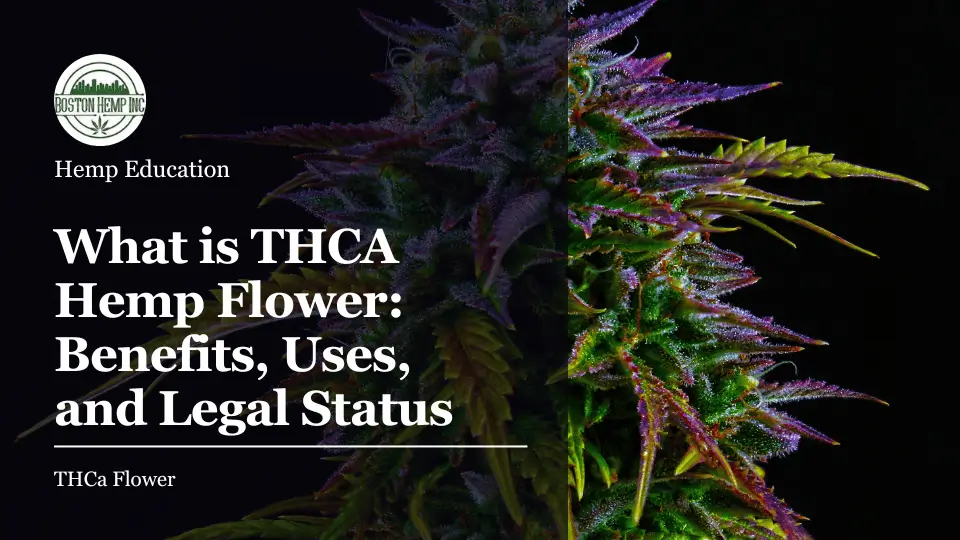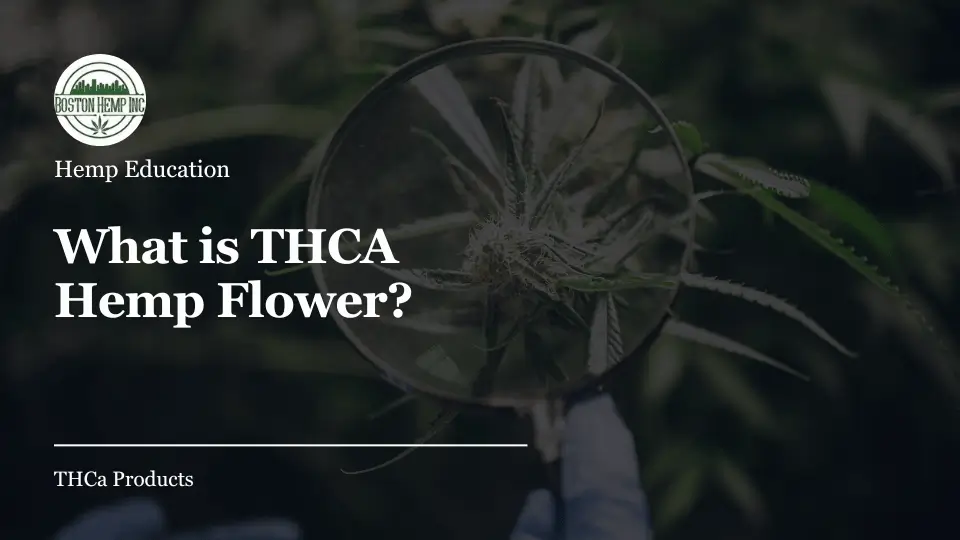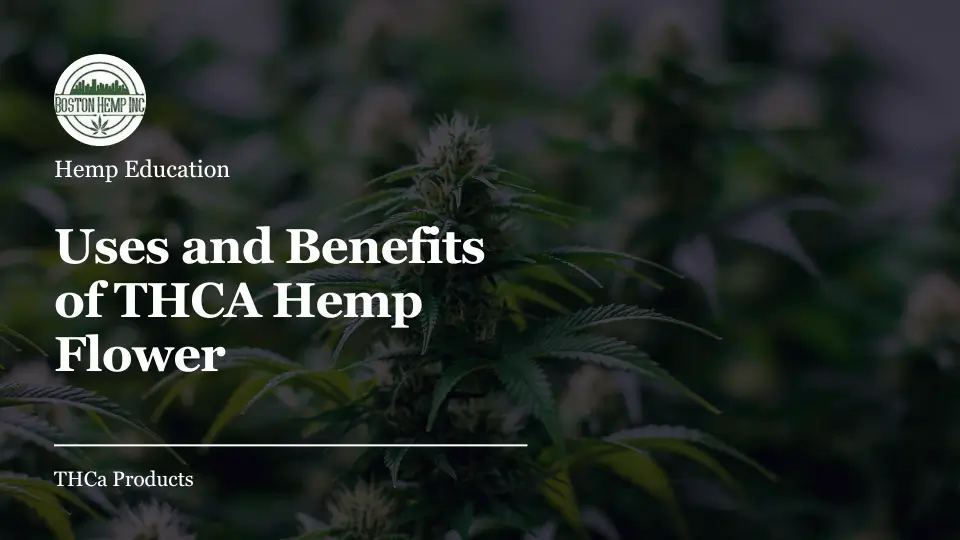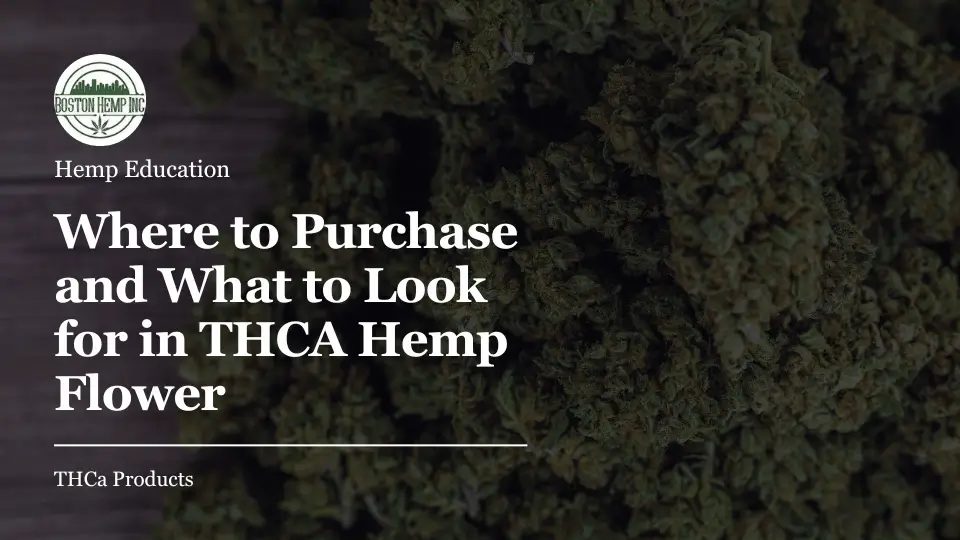Hey there, Kevin here with Boston Hemp Inc., and today, I want to introduce you to the fascinating world of THCA hemp flower.
If you’re curious about the benefits, uses, and legal status of this unique hemp product, you’ve come to the right place.
THCA hemp flower is a type of hemp bud that contains high levels of THCA, or tetrahydrocannabinolic acid.
Unlike THC, which is known for its psychoactive properties, THCA is non-intoxicating and is believed to offer a range of potential health benefits.
The uses of THCA hemp flower are varied and diverse, which we will get into soon.
From its potential to alleviate pain and inflammation to its ability to promote relaxation and improve sleep, this natural product has captured the attention of many individuals seeking a natural alternative to traditional remedies.
However, before exploring the uses and benefits of THCA hemp flower, it is essential to understand its legal status.
In the United States, the legal landscape around cannabis products can be complex, and it’s important to stay informed to ensure compliance with federal and state regulations.
In this article, I will delve into the world of THCA hemp flower, covering everything from its composition and properties to its potential benefits and legal aspects.
Whether you’re a curious consumer or an industry professional, this guide will provide you with valuable insights into the exciting world of THCA hemp flower.
Key Takeaways:
- THCA hemp flower is a type of hemp plant that contains high levels of THCA.
- THCA is non-intoxicating and may offer a range of potential health benefits.
- THCA hemp flower is used to alleviate pain, inflammation, promote relaxation, and improve sleep.
- Understanding the legal status of THCA hemp flower is crucial due to the complex legal landscape around cannabis products in the United States.
- This guide will provide valuable insights into the world of THCA hemp flower, covering its properties, benefits, and legal aspects.
What is THCA Hemp Flower?
A THCA hemp flower refers to the raw, unheated form of cannabis flower that contains high levels of tetrahydrocannabinolic acid (THCA) instead of delta-9 tetrahydrocannabinol (THC).
Unlike THC, THCA is a non-intoxicating cannabinoid that requires decarboxylation, or heating, to convert into THC.
THCA hemp flower is derived from the hemp plant, specifically bred to contain minimal levels of THC while maximizing the concentration of THCA.
Understanding THCA Flower
THCA flower is harvested from the female cannabis plant before it is dried and cured.
In its raw form, THCA is known for its potential therapeutic benefits, as it may possess anti-inflammatory, neuroprotective, and anti-emetic properties.
However, it does not induce the psychoactive effects associated with THC consumption.
When THCA is exposed to heat or prolonged storage, it undergoes decarboxylation, transforming into THC, and gaining its psychoactive properties.
What is THC?
THC, or delta-9 tetrahydrocannabinol, is the primary psychoactive compound found in cannabis.
When consumed, THC binds to the cannabinoid receptors in the brain and central nervous system, resulting in the characteristic euphoria, relaxation, and altered perception associated with cannabis use.
Unlike THCA, THC does not require decarboxylation to produce its psychoactive effects.
Difference between THCA and THC
The key distinction between THCA and THC lies in their chemical structures and effects on the body.
While both compounds are derived from the cannabis plant, THCA is the acidic precursor to THC, and it only becomes psychoactive when decarboxylated.
THCA is found in raw cannabis flower, while THC is present in cured or heated cannabis products.
Consuming THCA does not cause intoxication, while THC is known for its mind-altering properties.
Properties of High THCA Flower
High THCA hemp is characterized by its abundant concentration of THCA and minimal levels of THC.
This unique composition allows individuals to experience the potential therapeutic benefits of THCA without the intoxicating effects of THC.
High THCA hemp may be sought after for its anti-inflammatory, analgesic, and anti-anxiety properties, making it an appealing option for those seeking natural remedies.
THCA in the Hemp Plant
THCA is one of several cannabinoids present in the hemp or cannabis plant.
It is synthesized in the trichomes, small resinous glands found on the surface of the flower buds and leaves.
These trichomes serve as the storage site for various cannabinoids, including THCA.
As the hemp plant matures, THCA gradually converts into THC, prompting the need for careful cultivation and timely harvest to preserve the THCA content in the final product.
Uses and Benefits of THCA Hemp Flower
THCA hemp flower offers a multitude of uses and potential benefits.
Whether seeking natural remedies or exploring new wellness options, THCA hemp flower has something to offer.
How to Use THCA Flower
There are various methods of consuming THCA flower, allowing you to choose what suits your preferences and needs.
Here are a few common ways to use THCA hemp flower:
- Vaporizing or Smoking: Heat the THCA flower to release the beneficial compounds without combustion. Or if you use combustion, it will turn to smoke.
- Ingesting: Incorporate THCA flower into edibles, tinctures, or capsules for a convenient and discreet consumption method.
- Topical Applications: Create infused oils or creams to target localized areas for potential relief.
The Many Benefits of THCA
THCA has been associated with a wide range of potential benefits.
While more research is needed, users have reported the following advantages when using THCA hemp flower:
- Anti-inflammatory properties
- Potential pain relief
- Antiemetic effects, reducing nausea and vomiting
- Possible anti-anxiety and anti-depressant effects
- Promotion of general well-being
Is THCA a Precursor to THC?
Yes, THCA is a precursor to THC.
When THCA undergoes decarboxylation, typically through heat, it converts into THC, the psychoactive compound found in cannabis.
This process can occur naturally over time or can be accelerated through heating methods.
Can THCA Flower Get You High?
No, but yes. Consuming THCA flower alone does not produce the psychoactive effects associated with THC.
THCA is a non-intoxicating cannabinoid and does not induce a high when consumed in its raw form.
However, it may have therapeutic properties that can enhance overall well-being.
And if it is heated in any way via vaporizing, lighting on fire or even using oils to extract the THC-a it will become psychoactive.
THCA Hemp Products for Consumption
If you want to explore the benefits of THCA further, there are various hemp products available on the market, and of course, we recommend Boston Hemp Inc.’s Hemp Flowers for sale here.
These products are specially crafted to preserve the natural THCA content and offer convenient options for consumption, such as tinctures, capsules, and edibles.
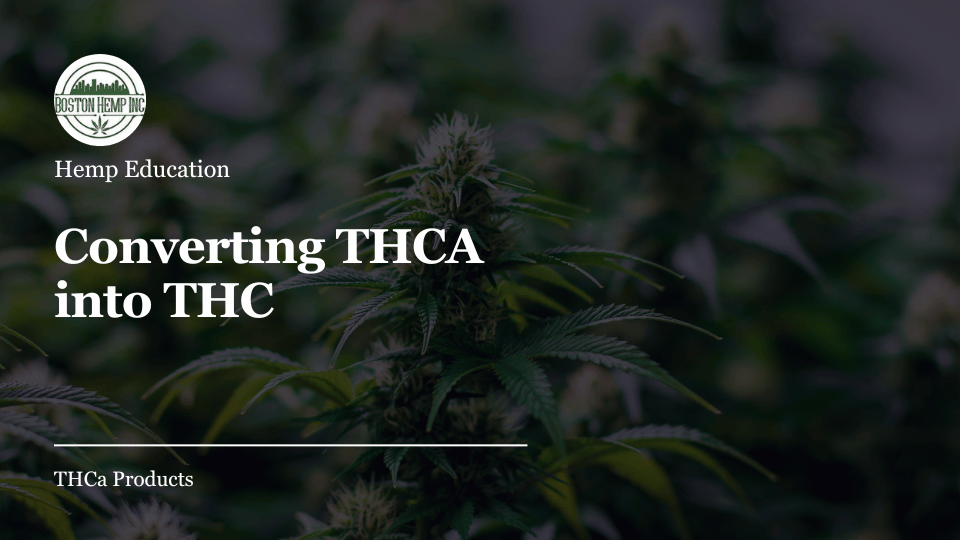
Converting THCA into THC
In the world of cannabis, understanding the conversion of THCA (tetrahydrocannabinolic acid) into THC (tetrahydrocannabinol) is crucial.
This process plays a fundamental role in unlocking the psychoactive effects and therapeutic potential of the plant.
In this section, we will delve into the intriguing process of converting THCA into THC, exploring its mechanisms, effects, and the implications for consumption.
Can THCA Convert into THC?
Yes, THCA can naturally convert into THC through a process known as decarboxylation.
Decarboxylation occurs when THCA is exposed to heat or light, causing a chemical reaction that removes a carboxyl group from the molecule.
This removal of the carboxyl group transforms THCA into THC, the compound responsible for the psychoactive effects associated with cannabis consumption.
How THCA Converts into THC
Decarboxylation, the process by which THCA converts into THC, occurs when the cannabis plant is exposed to heat.
This can happen through methods such as smoking, vaporizing, or cooking with heat.
The heat breaks down the carboxyl group and activates the THC molecule, making it available for binding to cannabinoid receptors in the body.
As a result, the consumer experiences the desired psychoactive and therapeutic effects.
Effects of THCA to THC Conversion
The conversion of THCA to THC brings about a significant change in the effects of cannabis consumption.
While THCA itself is non-intoxicating, THC is known for its psychoactive properties.
When THCA is converted to THC, consumers may experience euphoria, relaxation, altered perception, increased appetite, and other effects commonly associated with cannabis use.
This conversion enhances the potential therapeutic benefits and recreational enjoyment of cannabis products.
Consuming THCA vs Consuming THC
Consuming THCA and consuming THC can have different effects on the body due to their different molecular structures depending on the method of consumption.
THCA interacts with the endocannabinoid system differently than THC, resulting in non-intoxicating effects.
On the other hand, consumed THC directly binds to cannabinoid receptors, leading to psychoactive effects.
The choice between consuming THCA or consuming THC depends on an individual’s desired outcomes and preferences.
Levels of THC When THCA is Heated
When THCA is heated, whether through smoking, vaporizing, or cooking, the levels of THC present in the cannabis product increase significantly.
This is because the heat catalyzes the decarboxylation process, converting THCA into THC.
The higher the temperature and the longer the exposure, the greater the conversion rate.
Therefore, it is crucial to consider the desired THC levels when consuming heated cannabis products.
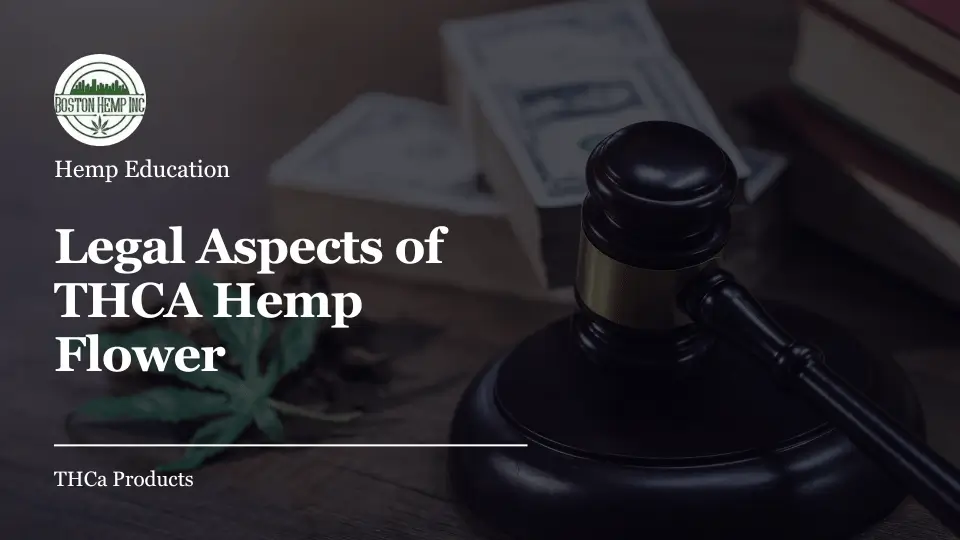
Legal Aspects of THCA Hemp Flower
When it comes to the legal aspects of THCA hemp flower, there are several important factors to consider.
From the legality of THCA flower to the terms of purchasing and the conversion of THCA to THC, understanding the legal landscape is crucial for anyone interested in this cannabinoid-rich hemp product.
Is THCA Flower Legal?
The first question many people have is whether THCA flower is legal.
The legal status of THCA flower can vary depending on various factors, including state laws and regulations.
While the 2018 Farm Bill legalized hemp and its derivatives, it is important to note that individual states have the power to impose additional restrictions or regulations on hemp products, including THCA flower.
Therefore, it is important to research and understand the specific laws in your state.
Legal Status of THCA Flower
The legal status of THCA flower is influenced by the THC content present in the product. In the United States, hemp products are considered legal if they contain no more than 0.3% THC on a dry weight basis.
However, THCA flower can have higher levels of THC before decarboxylation, the process by which THCA is converted to THC.
This means that the legal status of THCA flower can be more complex and may require additional considerations.
Terms of Purchasing THCA Flower
When purchasing THCA flower, it is essential to be aware of the terms and conditions surrounding the sale and use of the product.
Some vendors may require age verification or proof of legal eligibility to purchase hemp products.
Additionally, understanding the source, quality, and testing procedures of the THCA flower can ensure that you are making a legal and safe purchase.
Legality of THCA to THC Conversion
The legality of converting THCA to THC can be a subject of debate.
While THCA is non-psychoactive, it can be converted to THC through processes such as heating or decarboxylation.
The legality of this conversion may depend on various factors, including the specific laws of your state and the intended use of the converted product.
It is crucial to consult local laws and regulations to ensure compliance.
Understanding Industrial Hemp Legislation
To fully understand the legal aspects of THCA hemp flower, it is important to have a comprehensive understanding of the industrial hemp legislation in your country or state.
Industrial hemp legislation sets the framework for the cultivation, processing, and sale of hemp and its derivatives.
By reviewing the relevant legislation, you can gain insights into the specific regulations and requirements surrounding THCA hemp flower.
| Legal Aspects | Summary |
|---|---|
| Is THCA Flower Legal? | The legal status of THCA flower varies by state. |
| Legal Status of THCA Flower | THCA flower legality is influenced by THC content. |
| Terms of Purchasing THCA Flower | Be aware of purchasing requirements and product quality. |
| Legality of THCA to THC Conversion | The legality of conversion may vary based on location and use. |
| Understanding Industrial Hemp Legislation | Reviewing legislation provides insights into regulations. |
Where to Purchase and What to Look for in THCA Hemp Flower
In order to enjoy the benefits of THCA hemp flower, it’s important to know where to purchase it and what to look for.
If you’re in the Boston area, we’d love for you to stop by our shop and check out some of THC-a Flower products firsthand! Click here to see our address.
Whether you prefer the convenience of online shopping or the personalized experience of a local retailer, there are various options available for buying THCA flowers.
Where to Buy THCA Flower
When it comes to purchasing THCA hemp flower, you have two primary options: online retailers and local stores.
Online retailers offer a wide range of products like we do at Boston Hemp Inc., convenient shipping options, and the ability to compare prices and reviews.
On the other hand, local stores allow you to see and smell the flower before purchasing, and you can receive guidance from knowledgeable staff.
If you’re looking to buy thca flower in pounds, ounces, or grams, we’ve got you covered.
Choosing the Best THCA Hemp Flower
When choosing the best THCA hemp flower, several factors must be considered.
Quality is paramount, so look for carefully cultivated, harvested, and processed flowers.
Consider the sourcing of the flower as well, ensuring it comes from reputable, organic farms.
Additionally, check the seller’s reputation and read customer reviews to gauge the overall satisfaction of previous buyers.
Types of Hemp Flower Offers
THCA hemp flower comes in various strains, each with its own unique characteristics.
Some strains may have higher levels of other cannabinoids or terpenes, contributing to different effects and flavors.
Explore the different types of hemp flower offers available and choose the one that aligns with your preferences and desired outcomes.
Understanding THCA Content
THCA content is an important consideration when purchasing THCA hemp flowers.
THCA is the precursor to THC and is non-psychoactive in its raw form.
However, when heated, THCA converts into THC, which can induce psychoactive effects.
Understanding the THCA content of a flower can help you gauge the potential potency and effects.
Guide to Vaping THCA Flower
Vaping is a popular method of consuming THCA hemp flower due to its efficiency and fast-acting effects.
To vape THCA flower, you will need a compatible vaporizer device.
Follow the manufacturer’s instructions for loading and heating the flower, and start with a low temperature to preserve the THCA content.
Experiment with different temperatures to find the sweet spot that suits your preferences.
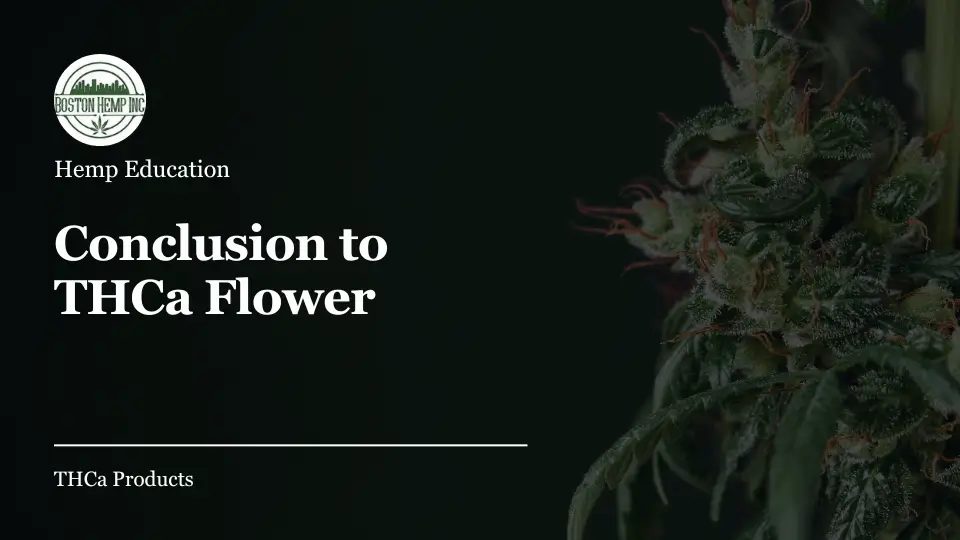
Conclusion to THCa Flower
In conclusion, the THCA hemp flower has emerged as a promising product in the cannabis industry.
As explored throughout this article, THCA hemp flower offers numerous benefits and has many uses.
From its potential medicinal properties to its popularity as a non-psychoactive alternative, THCA hemp flower has gained attention for its versatility and natural compounds.
Furthermore, it is crucial to understand the legal status of THCA hemp flower.
While the legality varies by state, THCA hemp flower has gained acceptance in many regions due to its low THC content.
As always, it is essential to abide by local laws and regulations when purchasing and consuming THCA hemp flowers.
When purchasing THCA hemp flower, be sure to consider factors such as quality, sourcing, and reputation of the seller.
Research a reputable supplier that provides lab-tested products to ensure safety and transparency.
Additionally, consider the various types of hemp flower offers and understand the THCA content to make an informed decision that aligns with your needs and preferences.
The THCA hemp flower offers a promising outlook for enthusiasts and those seeking alternative wellness options.
With its potential benefits, legal acceptance in many areas, and a growing market, THCA hemp flower has become a valuable addition to the cannabis industry.
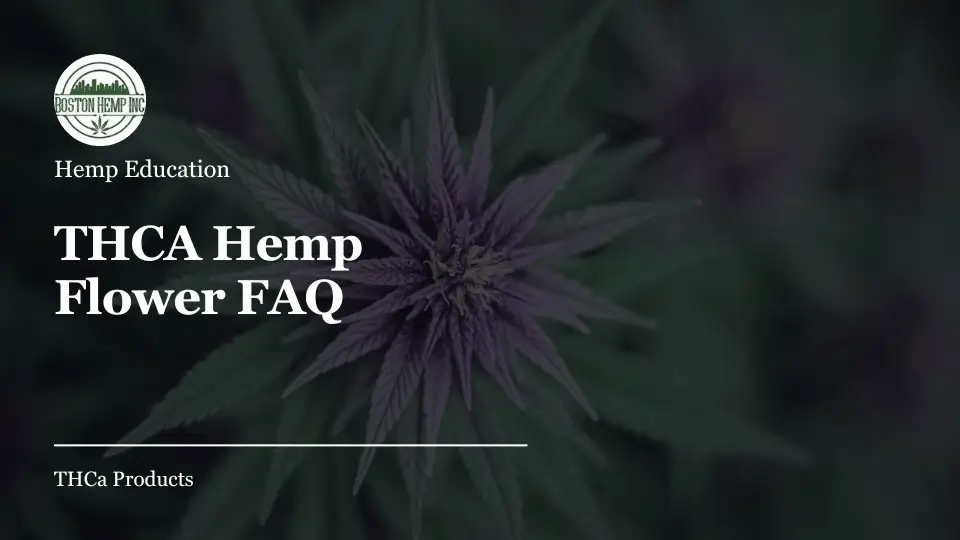
THCA Hemp Flower FAQ
What benefits of THCA flower can I expect?
THCA flower provides various benefits.
Since THCA is a non-psychoactive cannabinoid present in fresh cannabis, it can offer a therapeutic experience without the high.
THCA may act as a natural anti-inflammatory, neuro-protector, and anti-emetic when consumed.
However, continued research is required to fully appreciate the full breadth of benefits of THCA flowers.
What is the potency of THCA flower compared to regular THC flower?
The potency of THCA flower is different from regular THC flower.
This is because THCA doesn’t cause the “high” typically associated with marijuana flower, as it’s a non-psychoactive compound.
However, when THCA is converted into THC by heat, it takes on the psychoactive properties of THC.
How do you consume THCA flower?
You can consume THCA flower in several ways. It can be smoked or vaped, just like regular hemp bud.
The heat used in these methods transforms THCA into THC. Another option is consuming it raw in juices or smoothies, which keeps the cannabinoid in its original form.
Can THCA bud get you high?
No, THCA bud in its raw form does not get you high.
The fact that THCA is non-psychoactive means it won’t have the same effect as THC when consumed.
However, when THCA bud is heated, it transforms into THC and can produce psychoactive effects.
Is there a difference between THC and THCA?
Yes, there is a difference between THC and THCA.
They are both cannabinoids found in cannabis, but they have significantly different effects.
THC is a psychoactive compound that can get you high, whereas THCA, its precursor, is non-psychoactive and won’t produce that effect.
Nevertheless, THCA transforms into THC when heated.
What is the legality of THCA flower?
The legality of THCA flower is somewhat complex.
As long as the product doesn’t contain more than 0.3% Delta 9 THC, it’s considered legal under federal law.
However, since THCA can convert into THC when heated, some states have laws that categorize products with high THCA levels as marijuana, making them illegal under local law.
What are some popular high THCA flower strains?
Several THCA flower strains are known for their high THCA levels.
Each strain may offer a unique blend of terpenes, flavonoids, and other cannabinoids. Unfortunately, specific strain names are not standardized and can vary by grower or dispensary.
What are the side effects of THCA flower?
The side effects of THCA flower are minimal as THCA is non-psychoactive.
However, when it’s converted into THC (through decarboxylation or heat), the psychoactive effects may lead to side effects associated with THC, such as dry mouth, dizziness, altered perception, and occasional anxiety, especially in people with low tolerance.
What are some uses for THCA flower?
THCA flower can be used for several health and wellness applications. It may offer anti-inflammatory, neuroprotective, and anti-nausea benefits.
Some people also use it as an addition to a raw cannabis juicing routine for its potential health-boosting properties.
However, more research and clinical studies are needed to elucidate all its potential uses fully.
I am about to consume THCA flower for the first time; is there anything I should know?
If you’re planning to consume a THCA flower for the first time, it’s helpful to remember that its effects can be different to those of regular THC flower.
By consuming it raw, you are unlikely to experience any psychoactive effects because raw THCA is not intoxicating.
However, if you choose to smoke or vape the THCA flower, the heat will convert THCA into THC, which can cause a high.

